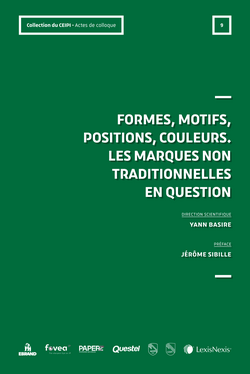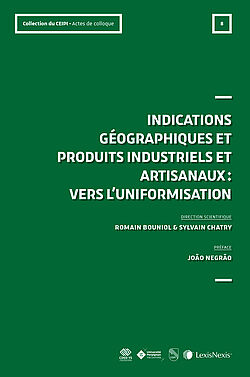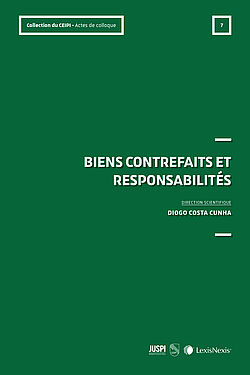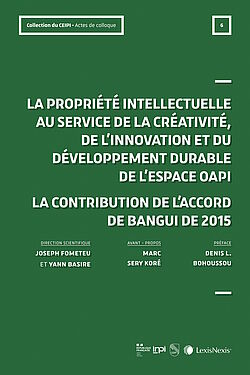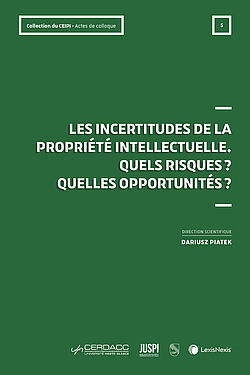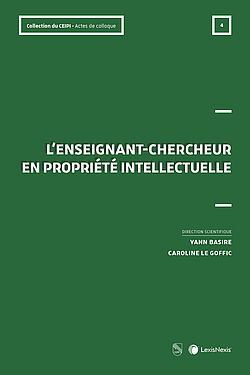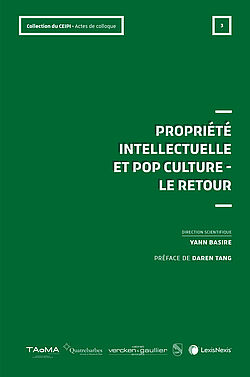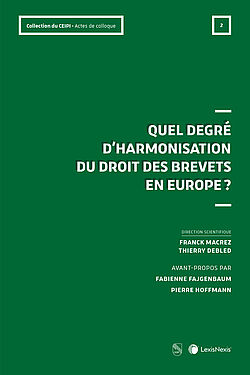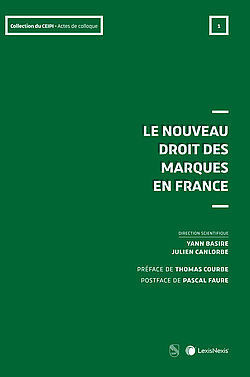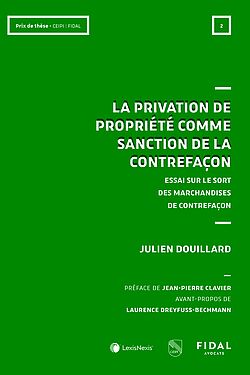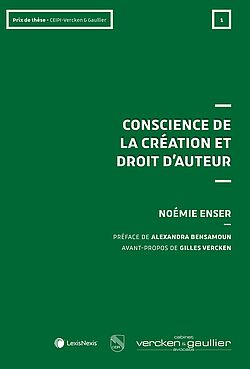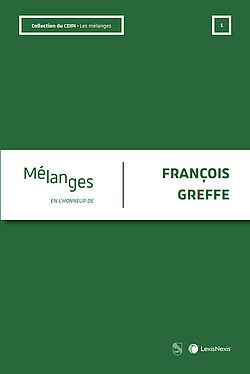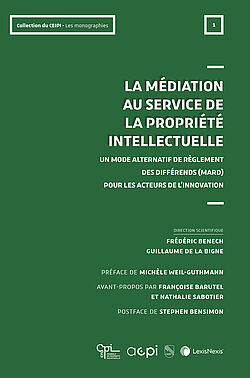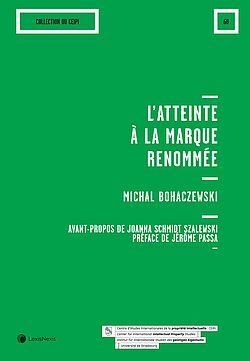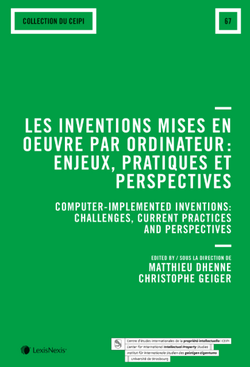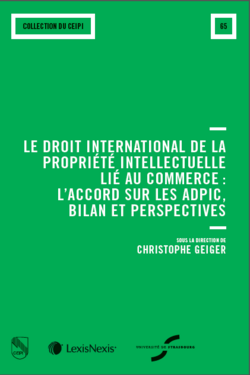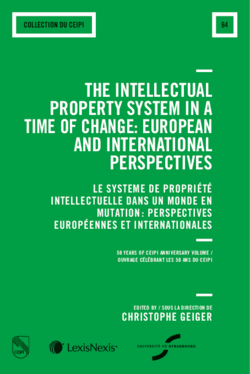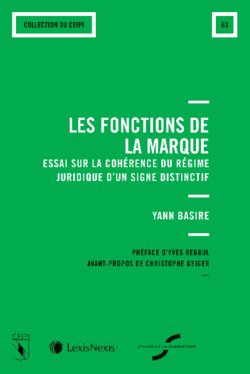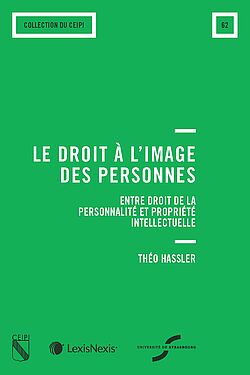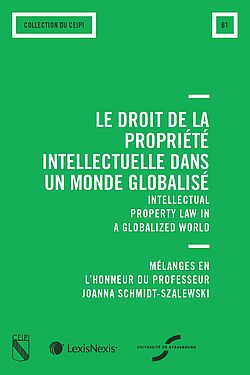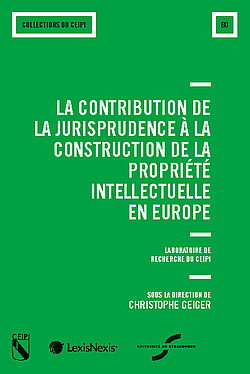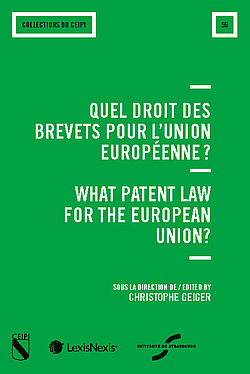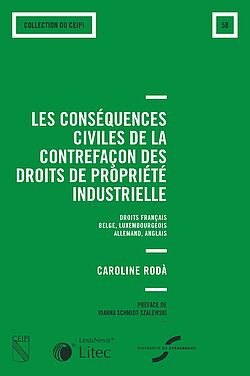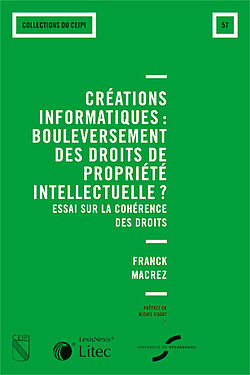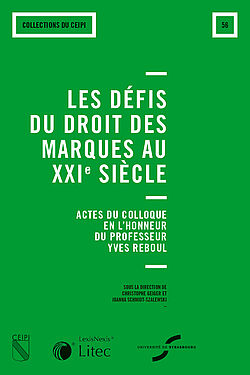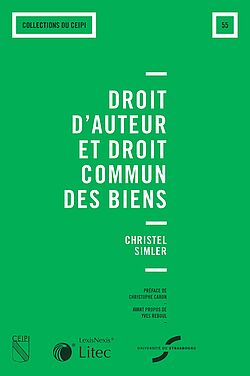Page contents
Formes, motifs, positions, couleurs. Les marques non traditionnelles en question, under the scientific direction of Yann Basire – Collection du CEIPI - Conference proceedings, n°9, LexisNexis, 2025
Preface by Jérôme Sibille, Director of General Administration & Legal Affairs for the LVMH Group, member of the Executive Committee and Secretary of the Board of Directors
Although deposits and registrations are overwhelmingly dominated by word and figurative marks, the interest of industry and economic operators in non-traditional marks cannot be denied. However, these marks are viewed with real suspicion by the competent authorities, which is why a book has been devoted to them, following a conference organised at the National Assembly.
It examines these marks in light of all the difficulties they may encounter and the questions they may raise. What about, for example, the examination of distinctiveness or the acquisition of that same distinctiveness through the use of three-dimensional marks, position marks, patterns or colours? What about the assessment of genuine use and, more specifically, use in a modified form, given that few three-dimensional marks are used without word marks?
By giving a voice to all stakeholders in the field, from manufacturers to magistrates, academics to offices, industrial property attorneys to lawyers, this book provides essential insights that we hope will help to dispel mistrust of non-traditional marks and enhance consistency.
Contributors to this book include: Yann Basire, Sylvie Benoliel, Clara Bovar, Julien Canlorbe, Christophe Caron, Julien Delucenay, Sandra Georges, Aurélie Guétin, Dorian Guiu, Olivier Hoarau, Stefan Martin, Charles-Henry Massa, Pierre Massot, Chloé Piedoie, Jérôme Sibille, Annette Sion.
To obtain a copy, please contact our Publishing Manager : caroline.ertz[at]ceipi.edu
« Indications géographiques et produits industriels et artisanaux : vers l’uniformisation » under the scientific direction of Romain Bouniol et Sylvain Chatry – Collection du CEIPI – Conference proceedings, n°8, LexisNexis, 2025
Preface by João Negrão, Executive Director of the European Union Intellectual Property Office (EUIPO).
The French legislature was one of the first EU countries to introduce specific protection for industrial or craft products (Hamon law of 18 March 2014).
Proof that this right meets a genuine expectation on the part of professionals, 23 geographical indications have already been approved by the INPI, namely (in chronological order): Siège de Liffol (2016), Granit de Bretagne (2017), Porcelaine de Limoges (2017), Pierre de Bourgogne (2018), Grenat de Perpignan (2018), Charentaise de Charente-Périgord (2019), Pierres Marbrières de Rhônes-Alpes (2019), Absolue Pays de Grasse (2020), Pierre d'Arudy (2020), Linge Basque (2020) and Poteries d'Alsace - Soufflenheim/Betschdorf (March 2022) and recently for five stones (Pierre Vianne, Pierre de Mareuil, Pierre de Paussac/Paussac-et-Saint-Vivien, Pierre de Fontbelle, Pierre de Limeyrat).
Almost ten years later, Regulation (EU) No 2023/2411 on the registration, protection and control of geographical indications (GIs) for craft and industrial products possessing a given quality, reputation or other characteristic linked to their geographical origin was published on 18 October 2023.
The protection of GIs is of great interest to national laws (competition law; trademark law), which until now were the only ones that could be used to protect the link between a geographical name and a product, and more generally to defend producers and distributors against fraudulent geographical connections.
The regulation promises uniformity in that it establishes a European Union title that will be protected on the territory of the Member States of the European Union. However, it will have to coexist with other pre-existing foundations that may have national disparities.
The aim of the colloquium was to bring together academics and practitioners specialising in these issues, both French and from other EU countries (Portugal, Spain, Italy, etc.), and to involve representatives of the EU Commission, the offices and representatives of existing French IGPIAs, in order to assess the extent of standardisation in relation to existing national provisions.
Contributors to this book include: Audrey Aubard, Yann Basire, Laurence Besse, Nicolas Binctin, Romain Bouniol, Sylvain Chatry, Jean-Pierre Clavier, Gilles Desaphy, Fabrice Descombes, Honoré Durand, Antoine Ginestet, Jean-Baptiste Horhant, Philippe Huppé, Caroline LE Goffic, Valérie Marie-d’Avigneau, Cristina Mendes, João Negrão, Jean Rodesch, Xavier Villas I Balasch, Elisa Zaera Cuadrado, Andrea Zapplaglio.
To obtain a copy, please contact our Publishing Manager : caroline.ertz[at]ceipi.edu
« Biens contrefaits et responsabilités » under the scientific direction of Diogo Costa Cunha – Collection du CEIPI – Conference proceedings, n°6, LexisNexis, 2024
Preface by Diogo Costa Cunha, Senior Lecturer and Director of the University Diploma in Patents at CEIPI, University of Strasbourg
Biens contrefaits et responsabilités provides an in-depth academic analysis of the complex issues raised by counterfeiting, drawing on legal, economic and sociological perspectives. Through contributions from a variety of disciplines, it analyses the underlying dynamics of this phenomenon and its implications, in particular the responsibilities of the various players involved, whether consumers, economic operators or regulators. The book also examines the legal and technological measures aimed at limiting access to counterfeit products, while highlighting the challenges associated with cross-border transactions and the specific features of sensitive sectors such as digital goods and pharmaceuticals.
Using the conceptual framework of liability law, this book offers a rigorous and multidimensional study of the interactions between counterfeiting, liability and innovation in a context marked by economic globalisation.
Divided into four main themes, this book first explores the links between counterfeiting, consumer behaviour and new forms of economic responsibility, looking in particular at buyers' motivations and legislative developments relating to defective digital products. The second section focuses on mechanisms for restricting access to counterfeit goods, including the regulation of online advertising, customs action and issues relating to access to knowledge. The third section analyses the international dimension of liability, with a particular focus on cross-border networks and issues specific to certain critical sectors, such as pharmaceuticals. Finally, the last section looks at the contributions of common law and contractual liability, examining in particular contractual relations, innovation strategies and public procurement in the context of the fight against counterfeiting.
Thanks to contributions from researchers and practitioners, this book is an essential resource for understanding the legal, economic and social dimensions of the fight against counterfeiting and for identifying concrete courses of action to deal with this global scourge.
Contributors to this book include: Apolline Bernard, Diogo Costa Cunha, Julie Dagher, Claire Despres, Laïsa Ferreira, Rémi Fouque, Camille Jalicot, Clotilde Jourdain-Fortier, Stéphanie Le Cam, André Le Roux, Romain Meyers, Delphine Sarfati-Sobreira.
To obtain a copy, please contact our Publishing Manager: caroline.ertz[at]ceipi.edu
« La propriété intellectuelle au service de la créativité, de l’innovation et du développement durable de l’espace OAPI. La contribution de l’accord de Bangui de 2015 » under the scientific direction of Joseph Fometeu et Yann Basire – Collection du CEIPI – Conference proceedings, n°6, LexisNexis, 2024
Foreword by Marc Sery Koré, Former Director of the WIPO Africa Office
Preface by Denis L. Bohoussou, General Director of the African Intellectual Property Organization (OAPI)
The Bangui Agreement and its ten Annexes were revised in Bamako on December 14, 2015. To contribute to the effective application of the normative corpus shared by its seventeen member states, OAPI and its partners have encouraged the publication of an Annotated Code of OAPI Law.
As an extension of this awareness-raising initiative, a symposium entitled “Intellectual property at the service of creation, innovation and development: the contribution of the Bangui Agreement”, jointly organized by the African Intellectual Property Organization (OAPI), the World Intellectual Property Organization (WIPO), France's Institut National de la Propriété Industrielle, the Centre d'Études Internationales de la Propriété Intellectuelle (CEIPI) and the University of Yaoundé II.
In view of the large number of participants, the diversity of the speakers and the wide range of issues addressed, this major scientific event provided an opportunity to discuss, from both a theoretical and practical point of view, the challenges and prospects of OAPI legislation in the current international legal and technological context.
This book brings together the essential contributions of the specialists who took part in this event. It explores the contribution of the Bangui Act of 2015 to the establishment of a common market through intellectual property, looking in particular at the powers of the OAPI, the delimitation of the common market and the free movement of goods, while at the same time comparing it with current issues such as public health, with the problem of access to medicines, sustainable development, with green innovation and respect for biodiversity; digital challenges, with, in particular, artificial intelligence, platforms and NFTs; and, of course, the issue of dispute resolution, with, in particular, the unavoidable subjects of jurisdictional competence, the value of a supranational jurisdiction and the usefulness of a mediation center.
Contributors to this book include: Koffi Étienne Alla, Yann Basire, Denis L. Bohoussou, Stéphanie Carre, Jean-Pierre Clavier, John Tambutoh Dashaco, Isabelle Ekémé, Camille Aristide Fade, Joseph Fometeu, Grégoire Jiogue, Ampah Johnson-Ansah, Christian Kpolo, Patrick Juvet Lowé Gnintedem, André Lucas, Fadika Madia, Stefan Martin, Max Lambert Ndéma Elongué, Yvon Laurier Ngombe, Simplice Ouattara Nicolas Roebben, Marc Sery Koré, Romain Soustelle, Jean Tankeu.
« Les incertitudes de la propriété intellectuelle. Quels risques ? Quelles opportunités ? », under the scientific direction of Darius PIATEK, - CEIPI's Collection - Conference proceedings, n°5, LexisNexis, 2024
Introductory remarks by Dariusz PIATEK, Associate Professor at the University of Haute-Alsace and member of the Centre Européen de recherche sur le Risque, le Droit des Accidents Collectifs et des Catastrophes (CERDACC, UR 3992)
Deeply marked by a phenomenon of amplification and even expansion, intellectual property law is the seat of many uncertainties, generating collective risks. Does it act as a brake on innovation, or rather a driving force behind its sharing? Is it a barrier to freedom or, on the contrary, a guarantor of creative freedom?
Whatever our vision of this fast-growing special right, we cannot ignore its grey areas. Ownership is uncertain, the scope of protection unclear, the objects of protection new and often diffuse...
These questions were the subject of the 6th annual colloquium of young academics specialising in intellectual property, organised by the European Research Centre for Risk, Collective Accident and Disaster Law in cooperation with the Centre for International Intellectual Property Studies at the University of Haute-Alsace in Mulhouse on 2 February 2023.
This book is a follow-up to that event.
Readers will first find the results of discussions between academics and practitioners who have tackled the subject of the uncertainties of intellectual property from different disciplinary approaches: the uncertainties surrounding the contours of the public domain, copyright contracts, the thresholds of protection for short excerpts of texts, the vagueness reigning in the field of photographers' copyright, trade mark law or the vagueness intrinsically linked to plural creation.
This analysis will be followed by a more cross-cutting discussion, looking in particular at the risks posed by new protected objects and even by new intellectual property 'ecosystems'.
To obtain a copy, please contact our Publishing Manager:caroline.ertz[at]ceipi.edu
« L’enseignant-chercheur en propriété intellectuelle », under the scientific direction of Yann Basire and Caroline Le Goffic, - CEIPI's Collection - Conference proceedings, n°4, LexisNexis, 2023
Introductory remarks by Edith BLARY-CLÉMENT, Professor at the University of Lille and Honorary Director of ERADP, (Équipe de Recherche Appliquée au Droit privé, University of Lille)
"L'enseignant chercheur en propriété intellectuelle": this was the title of a conference organised in Lille on 3 December 2021 by the Association des jeunes universitaires spécialisés en propriété intellectuelle (JUSPI).
The aim of the event was to highlight the challenges faced by intellectual property lecturers in French and foreign universities. Various academics and practitioners examined the specific features inherent in their field of specialisation and their areas of research.
This book constitutes the proceedings of that conference. It brings together contributions on the role of teacher-researchers, both within schools of thought and law faculties and in relation to professionals and institutions in the field of intellectual property. It also examines the virtues and dangers of hyperspecialisation, transversality and interdisciplinarity.
Finally, it looks at the renewal of themes and approaches in intellectual property law: digital technology, pop culture, etc. are all factors of openness that intellectual property research professors are seizing upon. This issue combines theoretical and practical insights into the way in which teacher-researchers see their role today.
Contributors to this fourth issue in the Conference Proceedings series include : Yann Basire, Edith Blary-Clément, Alexis Boisson, Sylvain Chatry, Sarah Dormont, Amélie Favreau, Thibault Gisclard, Stéphanie Le Cam, Caroline Le Goffic, Pierre-Emmanuel Moyse, Dariusz Piatek.
« Propriété intellectuelle et Pop Culture – Le retour » under the scientific direction of Yann Basire – CEIPI's Collection - Conference proceedings, n°3, LexisNexis, 2022
Preface by Daren Tang, General Director of WIPO
Beyond its didactic interest in understanding and making the law understood, Pop Culture also invites to adopt a prospective approach, in that it generates, as an economic and social phenomenon, a large number of questions that cannot be ignored by Intellectual Property. The study of Pop Culture through the prism of Intellectual Property mechanisms implies, in fact, questioning the emergence of new issues or challenges for specialists in the field.
In this perspective, the Center for International Intellectual Property Studies (CEIPI) brought together, on April 26, 2021, on the occasion of World Intellectual Property Day, academics and practitioners for the third edition of the "Intellectual Property and Pop Culture" conference.
The present work follows up on this event by taking up the division proposed at the time of the event, with a prologue, dedicated to Manga facing the challenge of the digital market, and three episodes, respectively devoted to IP subject matter, Protection models and finally, Infringements actions. The challenge is to understand themes specific to Pop Culture, sometimes ignored by the doctrine, such as simulations, "fictitious" trademarks, cultural appropriation, the status of the showrunner, the taxation of derivative products or the phenomena of Scantrad, Binge watching, Retrogaming and Cosplay.
Contributors to this third edition of the new Colloquium Proceedings Series include: Yann Basire, Nicolas Bronzo, Nathalie de Quatrebarbes, Jean-Marc Deltorn, Nilce Ekandzi, Julie Groffe-Charrier, Alain Hazan, Stéphanie Le Cam, Stefan Martin, Stéphanie Maury, Dariusz Piatek, Romain Régnier, Gilles Vercken, Daren Tang.
« Quel degré d’harmonisation du droit des brevets en Europe ? », under the scientific direction of Franck Macrez and Thierry Debled – CEIPI's Collection - Conference proceedings, n°2, LexisNexis, 2022
Foreword by Fabienne Fajgenbaum and Pierre Hoffmann, attorneys-at-law
The book proposes a comparative approach between the grant practices of the European Patent Office (EPO) and the French judicial jurisprudence. The objective of the comparative approach is to highlight the divergences and convergences of practices and interpretation of legal texts relating to the patentability of inventions: exceptions, exclusions, conditions of patentability (notion of invention, novelty, inventive step, industrial application).
The point of view adopted allows both, from a fundamental point of view, to analyze the methods of interpretation adopted by the various actors, but also, from a more concrete point of view, to draw consequences in terms of "good practices" for patent offices, industrial companies which file patents, industrial property attorneys who support them in this process.
Thus, at the end of an approach that is both scientific and didactic, the reader will benefit from a complete and up-to-date information on all patentability issues.
In order to do so, a close cooperation between the various actors of industrial property appeared necessary to carry out the proposed analysis. For it goes without saying that this approach cannot be carried out in isolation, but must be undertaken in perfect synergy with the main actors of intellectual property: the socio-economic world (patent engineers of industrial companies, decision-makers, industrial property attorneys, lawyers), institutional members (members of the French National Institute of Intellectual Property - INPI, the World Intellectual Property Organization - WIPO), the European Patent Office (EPO), the Community Plant Variety Office (CPVO), as well as academics (students, doctoral students, teaching staff / professors).
Different topics are developed: the protection conferred by the European patent, the European and French granting procedures, the patentable and non-patentable invention, the conditions of patentability.
All the contributions are the result of a web conference organized on April 13, 2021 by the Center for International Intellectual Property Studies (CEIPI).
This book is the second issue of CEIPI's new collection dedicated to the Proceedings of the conference and to which the following authors contributed : Laurence Basterreix, Nicolas Bouche, Charlotte Chambon, Cécile Collonnier, Thierry Debled, Fabienne Fajgenbaum, Renaud Fulconis, Pierre Hoffman, Virginie Landais, Franck Macrez, Laurent Mulatier, Martin Müller, Frédéric Pollaud-Dulian, Jacques Raynard, Stanislas Roux-Vaillard.
The « Nouveau droit des marques en France », under the scientific direction of Yann Basire and Julien Canlorbe – CEIPI’s Collection - Conference proceedings, n°1 (2021).
Preface by Thomas COURBE, Commissioner for Strategic Information and Economic Security
Almost thirty years after the adoption and entry into force of the Law of January 4, 1991, French trademark law is once again undergoing a major reform.
Ordinance no. 2019/1169 of November 13, 2019 and its Implementing Decree no. 2019/1316 of December 9, 2019 involve more than just a modest grooming or simple adjustment of the provisions of the Intellectual Property Code. The transposition of Directive (EU) 2015/2436 of December 16, 2015 by these texts marks a new stage in the “Europeanization” of this field, and further seals the dependence of national law on European law. This has led to very tangible changes in the practices of companies and practitioners (and more broadly of “users”, as trademark applicants are now known). These changes are also having a profound effect on this discipline, while at the same time renewing it.
It is this “new trademark law” that this book - which follows on from the colloquium organized online by CEIPI and the Intellectual Property Open Committee of the Paris Bar in April 2020 - sets out to address. It sheds both theoretical and practical light on the various aspects of the reform, namely trademark validity, quality signs, infringement and procedural reform.
Contributors to this book include : Géraldine Arbant, Yann Basire, Nicolas Binctin, Jean-Yves Cailliez, Julien Canlorbe, Thomas Courbe, Patrice de Candé, Valérie Dorey, Fabienne Fajgenbaum, Pascal Faure, Eleonore Gaspar, Bertrand Geoffray, Pierre Hoffman, Caroline Le Goffic, Laurence Lehmann, Jérôme Passa, Delphine Rullier.
Thesis
Julien Douillard,The deprivation of property as a penalty for counterfeiting. Essay on the fate of counterfeit goods, Collection du CEIPI, Prix de thèse CEIPI-FIDAL, n°2, LexisNexis, 2023
Foreword by J.P Clavier, Professor of Private Law, member of the Private Law Research Institute, University of Nantes.
Introductory remarks by Laurence Dreyfuss-Bechmann, Doctor of Law, Associated Attorney-at-law and National Director of the Economics Department - Intellectual Property Division (FIDAL Avocats).
In the context of the action in counterfeiting, the legislator has provided sanctions applying to goods counterfeiting an intellectual property right. These sanctions, qualified as deprivation of property, have the effect of limiting the use, or even losing the property of these goods qualified as counterfeit. However, it appears that the regulation, both legislative and judicial, of these measures is lacking. Judges tend not to give reasons of this optional sanction. Moreover, the destruction of goods can be carried out by customs without any intervention by the judge. When it is provisionally ordered, for only alleged counterfeit acts, this sanction can paralyze an activity that is ultimately legitimate. However, the deprivation of property does not appear to be systematically necessary to ensure the respect for an intellectual property right. Since counterfeiting causes only the loss of exclusivity, a prohibiting measure may be sufficient to enforce intellectual property rights. Thus, the scope of the work should be on implementation of such sanctions in order to reconcile at best the two properties, at a time when fundamental rights are gaining more and more influence.
Noémie Enser, Consciousness of creation and Literary and Artistic Property Law , Noémie Enser - CEIPI's Collection, PHD CEIPI Prize, Vercken&Gaullier, n° 1, LexisNexis, 2022
Preface by Alexandra Bensamoun, Professor of Private Law
Foreword by Gilles Vercken, Cabinet Vercken & Gaullier
According to Noémie Enser, Psychological awareness, this ability of human beings to understand their existence and the world around them, constantly raises questions, particularly in their relationship with the law.
Consciousness of creation approaches this subject through a very specific prism: that of copyright, in which the doctrine seeks, through the conscience of the author, sometimes his discernment, sometimes a desire to create, sometimes again a real mastery of the creative process in order to make them play a discriminating role in access to protection.
The conscience of the author appears, throughout the analysis, not as a real condition, but as a corrective, called to play on the margins to exclude the protection by copyright of certain creations when the “classic” conditions for protection such as the form and the originality do not play their role of filter.
While the development of artificial intelligence and the welcome given to it by the artistic community call into question the place of a human being in creation, questioning the condition of the author’s conscience is part of a researchon the essence of copyright.
This work received the PHD CEIPI – Vercken & Gaullier Prize in 2022.
Mélanges
« Mélanges en l’honneur de François Greffe », sous la direction scientifique de Yann Basire et de Flora Donaud, - Collection du CEIPI - Les Mélanges, n°1, LexisNexis, 2023.
Foreword by Yann Basire, Director Général of CEIPI.
François Greffe, a member of the Paris Bar, honorary professor at CEIPI where he taught for 40 years, and author of the Traité des dessins et des modèles, regularly updated and awarded a prize by the Académie des Beaux-Arts, was recognised as one of France's leading specialists in design law.
His contribution to intellectual property law is invaluable.
Over the past 60 years, François Greffe has not merely witnessed the development of design law, but has been one of its main protagonists, with the recognition of his commitment to the entire design industry extending far beyond the boundaries of the intellectual property world.
It was therefore logical, legitimate, if not expected, that a book should pay tribute to him. This has now been done with these Mélanges, which bring together authors from all over Europe (France, Benelux, the Netherlands, Germany, Austria, Switzerland, the United Kingdom, Spain, Portugal, Italy, Greece, Poland and Russia) to discuss the issues of multiple protection and multiple forms, both in the light of current case law and in the light of the forthcoming European reform of design law.
Contributors to this book include : Yann Basire, Nicolas Berthold, Ian Bishop, Yannis Chryssospathis, Natalia Kapyrina, Hermine Lacour, Georg S. Mayer, Gonçalo Moreira Rato, Igor B. Nestoruk, Yves Reboul, Elia Sugranes, Paolina Testa, Anna Tischner, Gertjan Van Den Hout, Christof Vièl.
Monographs
Frédéric Benech, Guillaume de La Bigne (dir.), La médiation au service de la propriété intellectuelle, Collection du CEIPI, Les Monographies, n° 1, LexisNexis, 2023
Préface by Michèle Weil-Guthmann, Magistrat honoraire, Vice-présidente du TGI de Paris (1977-1998) et diplomate (1998-2004). Médiatrice inter et intra-entreprises (droit des affaires, propriété intellectuelle).
Preliminary remarks by Françoise Barutel, Conseillère à la Cour d’appel de Paris and Nathalie Sabotier, 1ère Vice-présidente adjointe au Tribunal judiciaire de Paris.
Intellectual property is a field in which mediation is developing as an alternative method of conflict resolution.
Mediation is a process (conventional or judicial) which has existed in France since the 1995 law and which is organized under the aegis of a mediator, an independent, neutral, impartial and benevolent third party, who is bound to total confidentiality.
Implemented in Anglo-Saxon countries and with international organizations such as the WIPO or the EUIPO, it has not yet gained its credentials in France in terms of intellectual property disputes.
It therefore appeared necessary to highlight the emerging importance of this process in this field and to propose a work in French, dealing specifically with the subject.
Indeed, the objective of the mediator is to help the parties to find themselves a negotiated solution, taking into account their real interests and needs, by asking them not to remain focused only on their respective initial legal positions.
Mediation thus allows the emergence of tailor-made solutions leading to mutually acceptable pragmatic results that litigation cannot achieve, such as the maintenance of business relationships.
The book opens with interviews with judges specialized in intellectual property.
It then offers writings from the dissertations of IP professionals who have graduated from the IFOMENE postgraduate program (partner of the ENM, magistrates and the CNB’s lawyers), solidly enriched with chapters written by experienced mediators (prevention strategies, questions for application to patents, criteria to entry into a Hard IP mediation, creativity of mediation at the service of inventors, mediation and salaried inventors, mediation and coexistence of trademarks, mediation in audiovisual law, mediation and other alternative dispute resolution, state of the art in Europe).
La médiation au service de la propriété intellectuelle was directed by Frédéric Benech, Mediator, Intellectual Property Attorney and teacher of the Mediation and Intellectual Property module at IFOMENE and by Guillaume de La Bigne, Mediator, Industrial Property Attorney and President of the Mediation and Arbitration Commission of ACPI.
This book is the result of a meeting between members of the Association of European Mediators (AME) of the Paris Bar, - historical actors of mediation in intellectual property -, speakers and trainers at the Institute of Training in Mediation and Negotiation (IFOMENE), and mediators specialized in intellectual property of the International Arbitration Chamber of Paris (CAIP), all members of the Association of Industrial Property Attorneys (ACPI) or of the National Company of Industrial Property Attorneys (CNCPI).
Special Edition

« Friends et le droit » under the scientific direction of Yann Basire and Clotilde Biron – Collection du CEIPI – Special Edition, n°1, LexisNexis, 2025
Preface by Sophie Grech, journalist and host of “Réalisé sans trucage”, first french podcast dedicated to cinema
Who doesn't know the series Friends?
American sitcom from the 1990s, Friends tells the humorous story of the daily lives of a group of friends - some of them next-door neighbors - and their emotional and professional lives in New York. The series was an instant hit, as were its theme songs, which became a recognizable hit from the very first notes!
What young man hasn't identified with Joey (played by Matt LeBlanc), a failed comedian and philanderer, but eternal jokester and loyal friend, with Ross (played by David Schwimmer), the clumsy but endearing paleontologist recognized by his peers - or with the mysterious Chandler (played by the late Matthew Perry), whose sarcastic humor is matched only by his deep sensitivity?
What young woman hasn't recognized herself in the role of Monica (played by Courtney Cox), Ross's clean-cut chef and little sister, or Phoebe (played by Lisa Kudrow), an extravagant masseuse and musician, or Rachel (played by Jennifer Aniston), a naive daddy's girl who eventually builds a career in fashion ... and with whom Ross is secretly in love?
But this sitcom, which aired in France between 1996 and 2005, also found another audience: lawyers! Leading the “Intellectual Property and Pop-Culture” movement since 2020, Yann Basire, Clotilde Biron and Jérôme Sujkowski, both founders of ALLY Avocats, chose to examine the legal dimension of the Friends series as part of a symposium organized on December 14, 2023 at the Grand Rex (Paris), with the support of Novagraaf and Gilliot Avocat.
This book is a follow-up to that event.
Analyzing in turn the emblematic episodes and characters of Friends (10 seasons, 236 episodes), the contributors have successively examined, according to their areas of expertise and tastes : Labor Law (Stéphanie Le Cam, Senior Lecturer, University of Rennes 2); Real Estate Law (Hélène Gilliot, Lawyer) ; Product placement (Clotilde Biron, Lawyer); Family law (Jean-René Binet, Professor, University of Rennes 1); Animal law (Marie-Bénédicte Desvallon, Lawyer and Solicitor); and Intellectual Property Law (Yann Basire, Lecturer, University of Strasbourg and Éléonore Gaspar, Lawyer), Criminal Law (Anna Caresche, Lawyer) and the legal difficulties encountered by this sitcom during and after its broadcast (Gautier Kaufman, Lawyer). And do not forget the Preface written by Sophie Grech (journalist, host of “Réalisé sans trucage”, French first cinema podcast), a leading specialist in the series, who once again demonstrates that law and pop culture are certainly not incompatible.
Contributors to this book include: Yann Basire, Jean-René Binet, Clotilde Biron, Anna Caresche, Marie-Bénédicte Desvallon, Eléonore Gaspar, Hélène Gilliot, Sophie Grech, Gautier Kaufman, Stéphanie Le Cam.
CEIPI's Collection
Michal Bohaczewski, Infringement of the Trade Mark with Reputation - CEIPI’s collection n°68 (2022)
Preface byJérôme Passa, Associate Professor of Law, Professor at the University Panthéon-Assas (Paris 11), Lawyer at the Paris Bar.
Foreword by Joanna Schmidt Szalewski, Professor Emeritus, University of Strasbourg.
Infringement of the Trade Mark with Reputation offers an analysis that takes into account the French legislation modified by the ordinance n° 2019-1169 and having transposed the directive n° 2015/2436.
From now on, the protection of Trade Mark with Reputation is placed within the scope of the exclusive right and expressly provides that the infringement of a Trade Mark with Reputation constitutes a ground for nullity and, on opposition, a ground for refusal of a later mark.
By taking into account European Union law, the study takes into account the abundant case law of the Court of Justice and the General Court, as well as the practice of the European Union Intellectual Property Office (EUIPO) in invalidity and opposition procedures.
Michal Bohaczewski analyzes the fundamental concept of the Trade Mark with Reputation, distinguishes it from a well-known mark, examines the conditions of infringement of a Trade Mark with Reputation and presents the different forms of infringement recognized by the legislator: dilution, debasement and unfair advantage taken from the distinctive character or reputation of the mark.
Computer Implemented Inventions: Challenges, Current Practices and Perspectives,edited by Professor Christophe Geiger, Director General and Director of the Research Department of CEIPI, University of Strasbourg and Matthieu Dhenne, Lawyer at the Paris Bar and PhD in Law - CEIPI’s collection n°67 (2019)
At the heart of the knowledge economy, the protection of Computer Implemented Inventions is a fascinating yet complex topic in intellectual property law. The exclusion of computer programs from patentable subject-matter by the European Patent Convention renders an assessment of their patentability particularly problematic. Although, numerous decisions have been delivered on this topic by the Boards of Appeal of the European Patent Office, they are not always easy to comprehend; more so because they are sometimes contradictory to decisions delivered by national courts, thereby giving rise to legal uncertainty. In 2005 a proposed EU Directive which aimed at harmonizing national patent laws and practices of Member States was rejected by the European Parliament by an overwhelming majority, yet again demonstrating the sensitivity of this subject. While the demonstration of infringement and the co-existence of patent protection with protection granted to software under copyright law also raise questions, recent developments in US jurisprudence and the resolution of the AIPPI at the Sydney Congress has revived the debate surrounding this topic.
This book amalgamates contributions made at a symposium organized by AACEIPI and the CEIPI on 24 November 2017 (held at the Grand Chamber of the Court of Cassation) with many other fundamental studies on this topic, with the objective of offering a comprehensive understanding on this issue which is critical for both present and future patent law practice.
The book includes the contributions of Nicolas Binctin, Christophe Caron, Sylvain Chatry, Matthieu Dhenne, Christophe Geiger, Alain Girardet, Stuart J.H Graham, Charles de Haas, Benjamin Jean, Martin Köhler, Franck Macrez, Catalina Martinez, Frédéric Pollaud-Dulian, Emmanuel Py, Julien Richaud, Stefan V. Steinbrener, Bertrand Warusfel.
The protection of Trade Secrets, National and European Perspectives”, co-directed by Professors Jean Lapousterle and Bertrand Warusfel - CEIPI’s collection n°66 (2017)
The protection of trade secrets is of great interest to French and European companies and has close ties with the intellectual property law. The secret can thus represent an alternative to the protection conferred by the patent law when the strategic choice not to disclose the invention is made. In addition, it offers de facto protection to the elements that do not meet the conditions laid down in the Intellectual Property Code for the grant of exclusive rights.
Is it appropriate to strengthen the position of the trade secrets holders by sanctioning attempts to misappropriate or to outmaneuver them? The European Union thought so by recently adopting the Directive 2016/943 on the protection of undisclosed know-how and business information (trade secrets).
More than a year after the adoption of this text, the lengthy mechanics of the preparatory work seems to be initiated in order to transpose it in the different Member States. The movement will not elude France and we can expect to witness a resurgence of the disagreements and debates that consistently accompany the legislative work relating to this particular category of secrets. Numerous questions are raised and challenge business lawyers, barristers, journalists, whistleblowers and employees inclined to share the know-how acquired in previous positions with their new employers.
What is the legal nature of these trade secrets? How to define them? How to reconcile them with their potential impact on the holders of fundamental rights? What is the significance of the directive and how does it intend to preserve the confidentiality of secrets in the course of a trial? What are the omissions of the harmonization and are they likely to manifest themselves during the transposition?
These are some of the questions that this book addresses, its ambition being to contribute to the debate on the contours of a balanced protection of trade secrets.
The book includes the contributions of Adrien Basdevant, Nicolas Binctin, Christophe-André Frassa, Jean-Marie Garinot, Florence G’Sell, Jean Lapousterle, Constance Le Grip, Alain Michelet, Arnaud Martinon, Jean-Pierre Mignard, Jean Passa, Joëlle Simon, Bertrand Warusfel, Régis Vabres.
Click here to download the order voucher.
Trade-Related International Intellectual Property Law: the Trips Agreement, Assessment and Perspectives”, edited by Christophe Geiger –CEIPI’s collection n°65 (2017)
Concluded in 1994 as an outcome of the Uruguay round of multilateral trade negotiations, the Agreement on Trade Related Aspects of Intellectual Property Rights (TRIPs) has now entered into its third decade. As a central instrument in international IP law, it has brought a significant level of convergence among legislations as well as a new understanding of intellectual property rights protection, and thus has had a major influence on the development of this area of law. However, since it came into force, the Agreement has given rise to controversies and divergent interpretations, reaching well beyond specialised IP circles. In this collective publication, the CEIPI Research Department wishes to offer a cross-sectional analysis of the Agreement, its background, implementations, interpretations given by the WTO dispute settlement body, and various doctrinal perspectives. Thus, the preamble of the agreement and its general provisions, the sections concerning intellectual property law as well as the section on the implementation of rights are examined on various levels in light of the new challenges and perspectives, thereby touching on current issues in IP law.
Contributors to the book include: Paulin Edou-Edou, Christophe Geiger, Daniel Gervais, Carlos M. Correa, Luc Desaunettes, Séverine Dusollier, Yann Basire, Norbert Olszak, Natalia Kapyrina, Michel Vivant, Théo Hassler, Jacques De Werra, Joanna Schmidt-Szalewski, Caroline Rodà, Xavier Seuba.
Download the order form
The Intellectual property system in a time of change: European and International perspectives, edited by Christophe Geiger - CEIPI's Collection n°64 (2016)
Over the past decades the intellectual property system has witnessed significant changes due to new patterns of innovation and novel forms of creation. The challenges posed by the spread of new means of communication, the growth of international trade, the rise of development agendas related to global environmental, cultural and health concerns, have deeply influenced various areas where intellectual property matters. In order to adapt the intellectual property regime to this new context, important initiatives are underway at the European and international level, calling for collective reflection and debate.
This book presents reflections of high-ranking intellectual property officials and representatives of public institutions, renowned scholars in law and in economics, professionals and representatives of intellectual property rights intensive industries on the ways for future development of the European and international intellectual property systems in a globalized world. This volume of the books series results from the international conference celebrating the 50th anniversary of the Centre for International Intellectual Property Studies (CEIPI), organized in Strasbourg on the 27 and 28 November 2014 at the Council of Europe.
Contributors to the book include: Geoffrey Bailleux, Lionel Bently, Dan Burk, António Campinos, Trevor Cook, Jérôme Debrulle, Graeme Dinwoodie, Josef Drexl, Christoph Ernst, Christophe Geiger, Francis Gurry, Raimund Lutz, Elise Petit, Bruno van Pottelsberghe, Julia Reda, Pedro Roffe, Elke Van Rysselberge, Jens Schovsbo, Thierry Sueur, Antonius Tangena, Antony Taubman, Pierre Véron, Michel Vivant, Lanfen Wu, Conghui Yin, Xiang Yu.
Download the voucher.
The functions of a trademark, essay on the coherence of the legal regime governing a distinctive sign, Yann Basire - CEIPI's Collection n°63 (2014)
Through the Court of Justice’s interpretation of the Trademarks Directive the function of the trademark has become a crucial subject of trademark law. The essential function of a trademark, which is to guarantee the identity of the origin of goods, is henceforth almost systematically appraised by Community and national judges at all stages of the life of a trademark. In 2009, the Court of Justice “discovered” four new functions: advertisement, investment, quality and communication. This progress has blurred the limits and boundaries of trademark law. The trademark, a business’s intangible asset, whose initial function is to make it possible to identify products or services, takes on loosely-defined functions, that are legally questionable, and commercial or consumerist. It is quite legitimate to question the role of the trademark today. Is it still the object of an intellectual property right that benefits its holder, or has it become a “complex” sign with multiple boundaries serving the consumer. This is the question that the present study intends to answer. The aim is to demonstrate the coherence of the legal regime of the most valuable and the most fascinating of distinctive signs.
Click here to buy this book online.
The right to one’s image, between personnality and intellectual property right, Théo Hassler - CEIPI's Collection n°62 (2013)
The French “droit à l’image” (right to one’s image) is no longer only a personality right. The commoditisation of images of people has led jurisprudence to adapt to this evolution: the use of an image as a resource implies that it has become an asset which could lead to a new sui generis intellectual property right. This development is the object of academic discussions; the consequences of the various possible classifications are, however, not only theoretical disputes since they have practical implications on the legal regime of image contracts. The objective of this work is to provide students as well as legal practitioners with an up to date study of positive law as well as to give an overview of a field that is rich in case law and that in France lacks recent monographs. This study is all the more necessary since French jurisprudence has considerably evolved under the influence of judgements rendered by the European Court of Human Rights concerning freedom of expression.
Intellectual Property Law in a Globalized World - In honor of professor Schmidt-Szalewski - CEIPI's Collection n°61 (2013)
Professor Joanna Schmidt-Szalewski dedicated her brilliant academic career to contract law, intellectual property law and to competition law. In 2009 after having been director of the Research Section of the Center for International Intellectual Property Studies (CEIPI), she was awarded the honorary title of Emeritus Professor of the University of Strasbourg. Professor Joanna Schmidt-Szalewski strove to direct her research and teaching toward international law, European Union law and comparative law in her areas of expertise. It is because of her interest in these fields that throughout her career she was invited to the most prestigious universities and research institutes of the world. Her colleagues and friends wished to pay tribute to her with this collective work that brings together contributions on intellectual property law. It is a field that, as she taught, reaches beyond national borders and must be thought of within a European and international framework.
The contribution of case-law to the construction of the intellectual property in Europe, CEIPI's Research department, edited by Christophe Geiger - CEIPI's Collection n°60 (2013)
The elaboration of European Intellectual Property Law is a work in progress. The Courts of the European Union, as well as the Boards of Appeal of the various European and Community Offices, are increasingly being asked to interpret different concepts of European law. Thereby, they contribute substantially to defining the contours of this emerging legal framework and are thus an important channel for harmonization. However, the guidelines provided by judges are not always clear, making it sometimes difficult to understand the exact scope of European Intellectual Property Legislation.
The aim of this collective work is to attempt an analysis of such case-law and to highlight its contribution to the European construction of copyright law, design law, trademark law (especially with regard to keywords advertising), patent law (in particular concerning the notion of patentable invention), plant varieties protection, geographical indications, and enforcement of intellectual property rights. The increased use of competition law and of fundamental rights in EU case-law in the field of intellectual property will also be addressed.
What Patent law for the European Union?, proceedings of the conference organized by the CEIPI at the European Parliament, April 26 and 27, 2012, edited by Christophe Geiger - CEIPI's Collection n°59 (2013)
The European Patent System stands at crossroads. Although an agreement on a European Union patent was expected, the creation of such an instrument ran up against several difficulties. As a consequence, the implementation of a European patent with “unitary effect” through the mechanism of enhanced co-operation was decided. At the same time, the Court of Justice of the European Union (the CJEU) issued a negative opinion on the legislative proposals to create a European Patent Court which, in turn, led to the adoption of a revised text that sparked major debates. The need to reflect on the future of the patent system in the European Union is felt as never before.
In this context, the Centre for International Intellectual Property Studies (CEIPI) brought together renowned academics, eminent professionals, judges, and institutional representatives active in the field of intellectual property for a conference on the topic “What Patent Law for the European Union?” held on 26 and 27 April 2012 at the European Parliament in Strasbourg.
This book presents the results of this important event and proposes areas for further consideration with a view to the development of an effective and balanced legal and judicial framework for patents within the European Union.
This book is up to date with the Regulation (EU) N° 1257/2012 of 17 December 2012 implementing enhanced cooperation in the area of the creation of unitary patent protection and the Council Regulation (EU) N° 1260/2012 of 17 December 2012 implementing enhanced cooperation in the area of creation of unitary patent protection with regard to the applicable translation arrangements.
Civil Consequences of Infringement of Industrial Property Rights, Caroline Rodà - CEIPI's Collection n°58 (2012)
This book is the updated version of a doctorate thesis defended by Caroline Rodà at the University of Strasbourg under the supervision of Joanna Schmidt-Szalewski.
This study attempts to determine, on the one hand, whether Directive 2004/48/EC is likely to strengthen the respect for industrial property rights and, on the other hand, whether the initiative of the European authorities led to the harmonization of French, Belgian, Luxembourg, German and English law regarding the civil consequences of infringement of industrial property rights.
Computer creation : disruption of the intellectual property rights ? Essay on the coherence of rights, Franck Macrez - CEIPI's Collection n°57 (2011)
This book is the updated version of a doctorate thesis defended by Franck Macrez at the University of Montpellier under the supervision of Michel Vivant.
The influence of information technology on intellectual property law is undeniable. The breadth of its impact requires a global assessment, both from the point of view of the rights and the relevant creations. Copyright law, patent law and trademark law are concerned by the emergence of creations such as software, multimedia works or domain names.
It is important to assess the impact of these creations on the legal system and to determine whether this evolution has caused a disruption of intellectual property rights. Based on a critical approach, this implies an analysis of the extension of intellectual property protection, while evaluating its concrete consequences.
This phenomenon leads to a risk of overlap between different rights. The way they interact must be examined. The methodology underlying the concept of a legal system enables a general assessment of the evolution of the legal order, and the necessary coherence of the law constitutes a framework that shapes the transformations.
Challenges of trademark law in the 21st century, proceedings of the conference held in honour of Professor Yves Reboul, edited by Christophe Geiger, Associate Professor and General Director of CEIPI and Joanna Schmidt-Szalewski Professor emeritus at the University of Strasbourg and former head of the CEIPI Research Laboratory - CEIPI's Collection n°56 (2010)
Trademark law, like the rest of intellectual property law, is experiencing an unprecedented transformation at the begining of the 21st century. It faces new challenges that this collective work edited by Christophe Geiger, Associate Professor and General Director of CEIPI and Joanna Schmidt-Szalewski Professor emeritus at the University of Strasbourg and former head of the CEIPI Research Laboratory, proposes to study.
